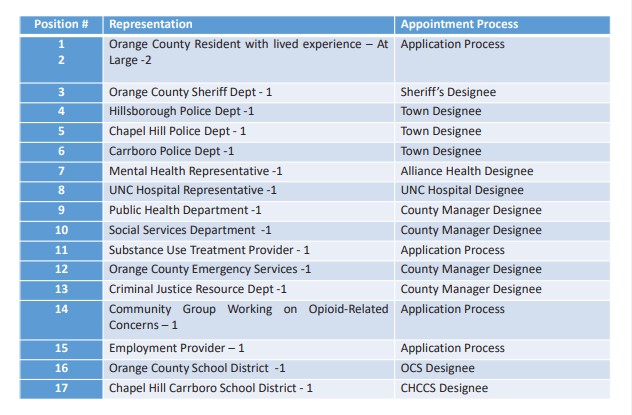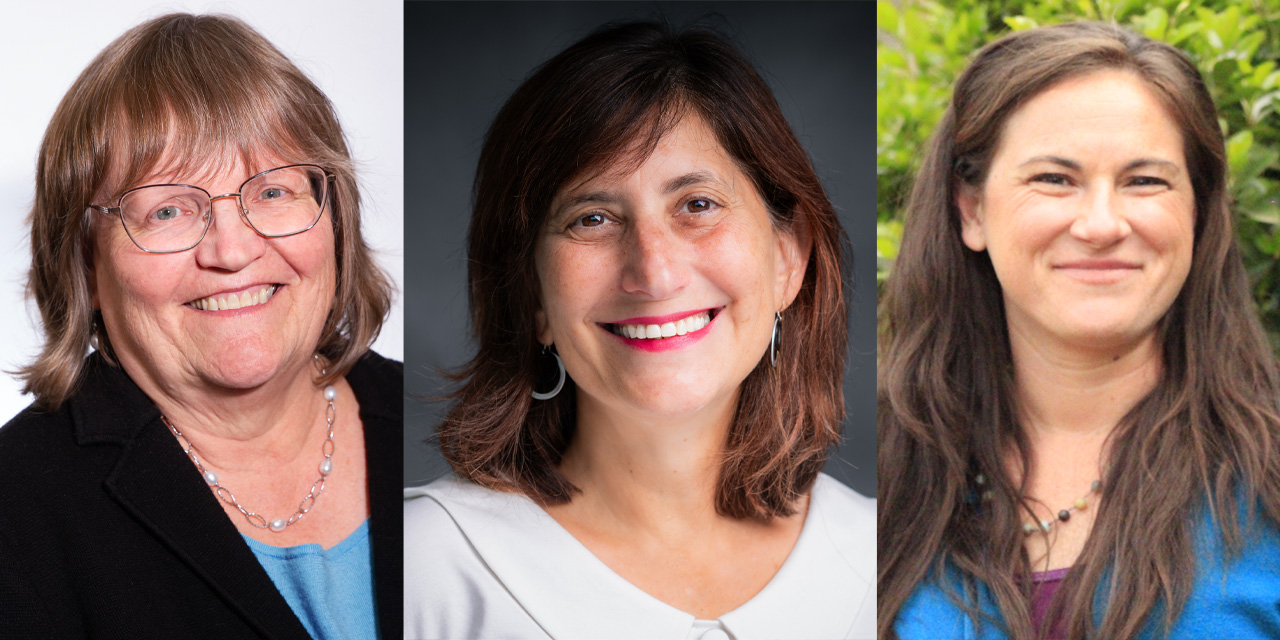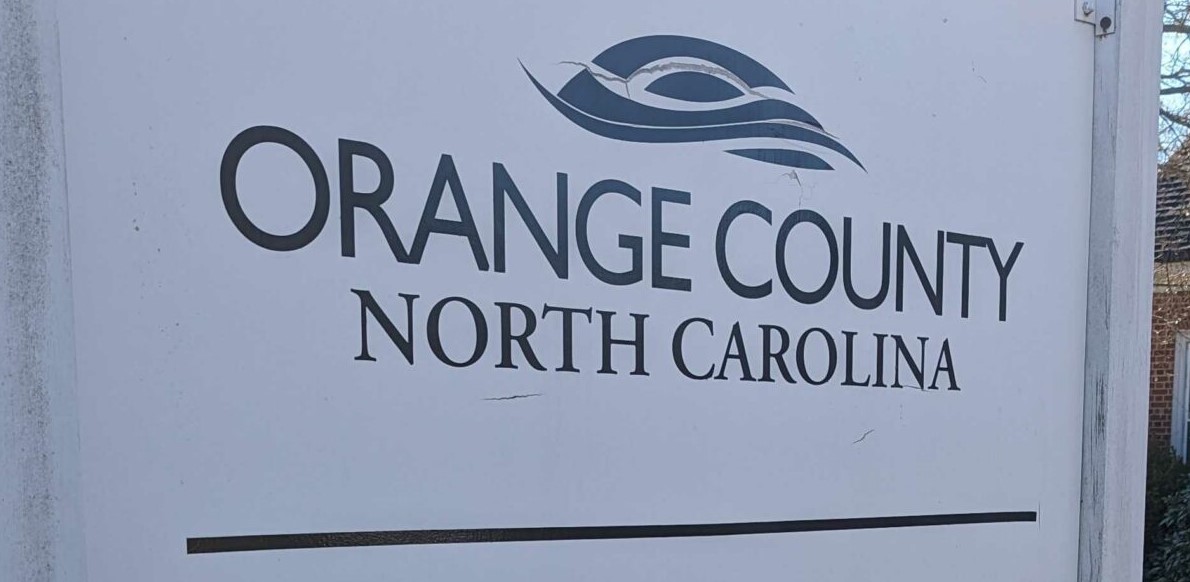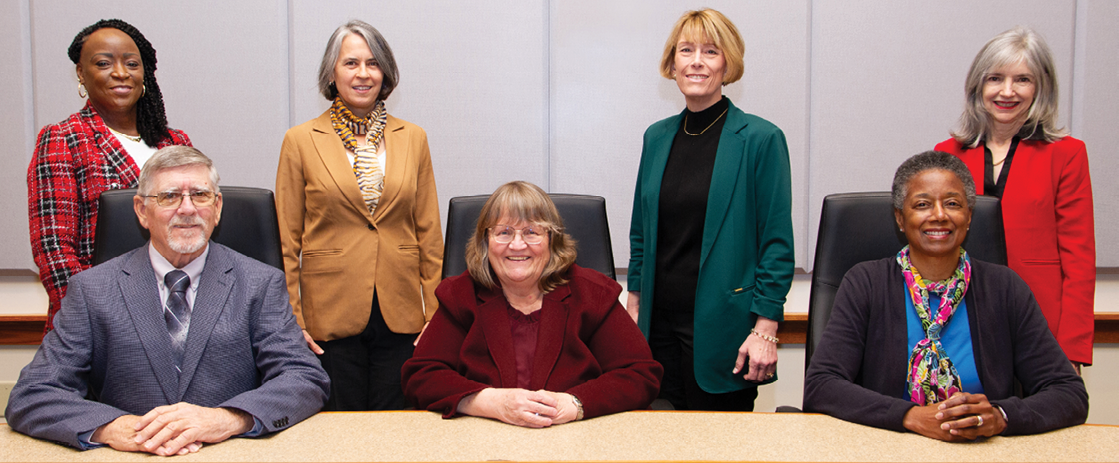Around eight North Carolinians die each day due to an opioid overdose, according to state data. As part of a major settlement, local governments are beginning to get additional funds to address the crisis and explore resources.
During its latest meeting, the Orange County Commissioners charted a course for its Opioid Advisory Committee, which will help decide what to do with their portion of the money.
The $26 billion settlement was structured last year by attorneys general across the U.S., including North Carolina’s Josh Stein. By the time that drug maker companies agreed to the terms in February, many states already had begun considering what to do with their portions. For North Carolina, $750 million will be split across the 100 counties, with Orange County receiving nearly $6.8 million over the course of 18 years.
To help the local governments decide what to do with their respective committees, the North Carolina Association of County Commissioners laid out some requirements to consider – which Orange County Commissioner Sally Greene helped craft with the organization. Among the requirements are for counties to choose between two different approaches for their funds. Option A dictates categories of spending the settlement money must be used for, while Option B includes a more robust strategic planning portion around treatment, prevention and other strategies to addressing the opioid crisis.
Orange County Health Director Quintana Stewart presented to the county commissioners at the September 6 meeting to provide details and guidance. She said the direction many Triangle-area governments are going with their committees are different than what they discussed at a gathering six months ago.
“At that time in March,” Stewart recalled, “I’d say for our region, every county thought ‘we’re going to do Option B.’ That just felt intuitive to how we do our work: we always collaborate, meet and talk. But to date, I only know of one county that is still looking at Option B as [their] choice.”
The county commissioners largely agreed, citing Option A’s ability to use the funds faster, build upon some already-existing programs and still do strategic planning through its opioid advisory committee. Commissioner Jean Hamilton said she believes that is a benefit, considering how much Orange County is ultimately receiving from the settlement.
“It’s not that much money, let’s be honest,” said Hamilton. “Over 18 years? Think about inflation.
“So,” she continued, “it seems like we need to know who in our community is at risk for overdose and what we choose as a strategy should depend on what’s going to have the greatest impact given the limited dollars. That’s going to be the hard work [for the committee]: we create a latitude, be careful and track to see if we’re getting the results we’re expecting from the investment.”
The board of county commissioners unanimously agreed on the method, as well as establishing the Opioid Advisory Committee’s charge with an emphasis on overdose prevention. The next step will be building out this committee of community stakeholders, with a list suggested to the elected officials at the same meeting. Since the committee will examine any gaps in the county’s current resources and brainstorm additional responses to the opioid crisis, there is a variety of seats available.
Still, the board settled on expanding the 17 suggested seats by county staff to include two additional flex seats. Hamilton said she wanted to see more inclusion of those with lived experience regarding opioid addiction or overdose.
“These are big committees, but I think we’d benefit from having a greater voice from the folks who have actually struggled with this issue,” she said.

The recommended seats on Orange County’s Opioid Advisory Committee, which will bring suggestions on how to spend settlement funding. The board of county commissioners ultimately approved two additional “flex” seats open to any community members. (Photo via Orange County.)
Commissioner Jamezetta Bedford said she disagreed with four of the seats being dedicated to the Chapel Hill, Carrboro and Hillsborough Police Departments, as well as the Orange County Sheriff’s Office. She said she’d prefer for those spots to go to other professionals with different perspectives and law enforcement could be integrated a different way.
“I think the group should be taking a more medical and social approach, normalizing it more as a [related] concern,” said Bedford. “In that way, the group could certainly have a session where they invite all the law enforcement, get their input, include them, address them. And of course, they’re public meetings, so everyone is welcome [to attend].”
Commissioner Earl McKee rebutted the exclusion of one law enforcement agency over another, saying he believes each department can share perspectives and strategies from within their own jurisdictions. McKee also added that in addition to being first responders to many opioid overdoses, the local police approach is different than others in the U.S.
“Given the fact that this board and the town boards in Orange County made a concerted effort to impose our will that we refocus from punishment to prevention,” he said, “I think our law enforcement are well aware there has to be a new strategy, a focus on trying to address root causes.”
As part of the state’s Memorandum of Agreement, Orange County will be required to hold a meeting each year to discuss how the settlement funds are being used to and get feedback. The meeting, as well as other sessions of the Opioid Advisory Committee, will be open to the public and other local government representatives.
Orange County said its staff will aim to collect applications with the goal of making appointments to the Opioid Advisory Committee by November 15. To read more about North Carolina’s opioid settlement and the direction of funds, visit the dedicated state web page.
Photo via Olga DeLawrence.
Those struggling with addiction can call the NAMI NC HelpLine. This is an information and referral service for North Carolinians in need of counseling support for substance abuse, alcohol addiction, and suicidal tendencies. The help hotline number is available from Monday all through to Friday starting from 9 a.m.- 5 p.m., EST. The line is 1-800-451-9682.
Naloxone, or Narcan, can be used to reverse a drug overdose. The Orange County Health Department offers free Naloxone kits and training by appointment. Call 919-245-2400.
Chapelboro.com does not charge subscription fees, and you can directly support our efforts in local journalism here. Want more of what you see on Chapelboro? Let us bring free local news and community information to you by signing up for our biweekly newsletter.










